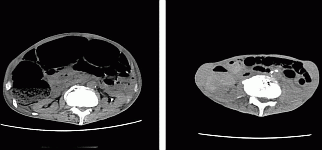ICEECE2012 Poster Presentations Clinical case reports - Thyroid/Others (81 abstracts)
Marked improvement of gastrointestinal pseudo-obstruction after debulking surgery of malignant pheochromocytoma by Intravenous administration of α-blocker phentolamine
S. Yamaguchi , H. Shibata , K. Miyashita , I. Kurihara , H. Oguchi , K. Futatsuki , A. Murai-Takeda , Y. Mitsuishi , Y. Motosugi , R. Jo , K. Hayashi & H. Itoh
Keio University, School of Medicine, Shinjuku-ku, Japan.
We present a case of severe malignant pheochromocytoma complicated with intestinal pseudo-obstruction, which was refractory to conventional therapies but reacted to intravenous administration of an α-blocker, phentolamine.
Malignant pheochromocytoma typically metastasizes to bones, liver, lungs, and lymph nodes, and average 5-year survival rate in the patient with metastases is approximately 50%. Treatment options for malignant pheochromocytoma include surgical debulking, external irradiation and systemic antineoplastic therapy. The survival rate worsens in proportion to tumor size, so the essential therapeutic goal is tumor reduction by debulking surgery even if the surgery is not curative, and control of symptoms of excessive catecholamine secretion.
We present a case of 65-year-old man who suffered from transient ischemic colitis and persistent paralytic ileus complicated with megacolon due to pseudo-obstruction developing after the surgical manipulation of malignant pheochromocytoma. Even though other symptoms including hypertension were well controlled, the abdominal symptom was fatal. The pseudo-obstruction showed poor response to conventional treatment including oral administration of α- and β-blockers, yet was relieved promptly with chronic intravenous administration of an α-blocker, phentolamine.
In summary, surgical treatment can trigger this kind of ileus in a patient with pheochromocytoma producing higher levels of catecholamines, even though other symptoms are well controlled. We suggest that intravenous administration of an α-blocker, phentolamine, should be initially considered in such gastrointestinal pseudo-obstruction due to overproduction of catecholamines, especially for the patient who is unable to take meals or drugs efficiently, prior to embarking on surgical decompression of severe megacolon.
Declaration of interest: The authors declare that there is no conflict of interest that could be perceived as prejudicing the impartiality of the research project.
Funding: This research did not receive any specific grant from any funding agency in the public, commercial or not-for-profit sector.

Figure 1 Abdominal CT findings of the gastrointestinal pseudo-obstruction after surgery (left) The abdominal CT findings of the megacolon on postoperative day 2. (right) The abdominal CT findings after treatment with intravenous administration of phentolamine.
 }
}



